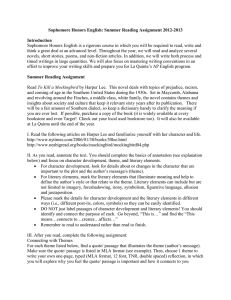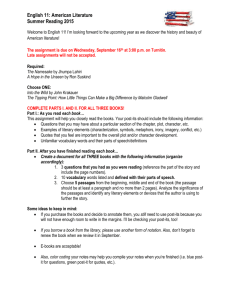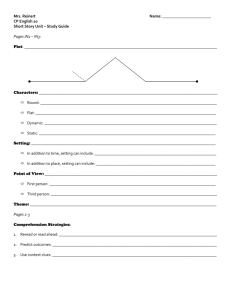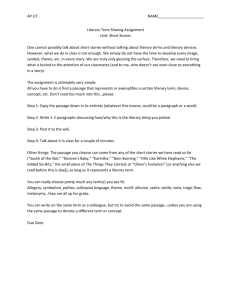Sophomore Honors English: Summer Reading Assignment 2011-2012 Introduction
advertisement
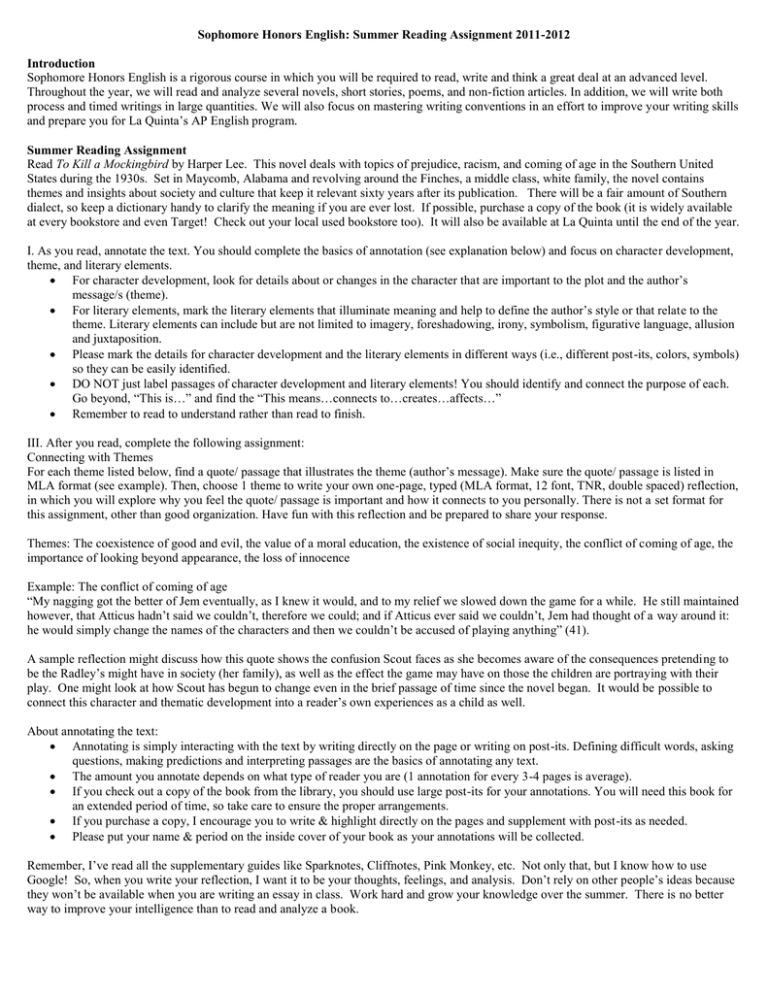
Sophomore Honors English: Summer Reading Assignment 2011-2012 Introduction Sophomore Honors English is a rigorous course in which you will be required to read, write and think a great deal at an advanced level. Throughout the year, we will read and analyze several novels, short stories, poems, and non-fiction articles. In addition, we will write both process and timed writings in large quantities. We will also focus on mastering writing conventions in an effort to improve your writing skills and prepare you for La Quinta’s AP English program. Summer Reading Assignment Read To Kill a Mockingbird by Harper Lee. This novel deals with topics of prejudice, racism, and coming of age in the Southern United States during the 1930s. Set in Maycomb, Alabama and revolving around the Finches, a middle class, white family, the novel contains themes and insights about society and culture that keep it relevant sixty years after its publication. There will be a fair amount of Southern dialect, so keep a dictionary handy to clarify the meaning if you are ever lost. If possible, purchase a copy of the book (it is widely available at every bookstore and even Target! Check out your local used bookstore too). It will also be available at La Quinta until the end of the year. I. As you read, annotate the text. You should complete the basics of annotation (see explanation below) and focus on character development, theme, and literary elements. For character development, look for details about or changes in the character that are important to the plot and the author’s message/s (theme). For literary elements, mark the literary elements that illuminate meaning and help to define the author’s style or that relate to the theme. Literary elements can include but are not limited to imagery, foreshadowing, irony, symbolism, figurative language, allusion and juxtaposition. Please mark the details for character development and the literary elements in different ways (i.e., different post-its, colors, symbols) so they can be easily identified. DO NOT just label passages of character development and literary elements! You should identify and connect the purpose of each. Go beyond, “This is…” and find the “This means…connects to…creates…affects…” Remember to read to understand rather than read to finish. III. After you read, complete the following assignment: Connecting with Themes For each theme listed below, find a quote/ passage that illustrates the theme (author’s message). Make sure the quote/ passage is listed in MLA format (see example). Then, choose 1 theme to write your own one-page, typed (MLA format, 12 font, TNR, double spaced) reflection, in which you will explore why you feel the quote/ passage is important and how it connects to you personally. There is not a set format for this assignment, other than good organization. Have fun with this reflection and be prepared to share your response. Themes: The coexistence of good and evil, the value of a moral education, the existence of social inequity, the conflict of coming of age, the importance of looking beyond appearance, the loss of innocence Example: The conflict of coming of age “My nagging got the better of Jem eventually, as I knew it would, and to my relief we slowed down the game for a while. He still maintained however, that Atticus hadn’t said we couldn’t, therefore we could; and if Atticus ever said we couldn’t, Jem had thought of a way around it: he would simply change the names of the characters and then we couldn’t be accused of playing anything” (41). A sample reflection might discuss how this quote shows the confusion Scout faces as she becomes aware of the consequences pretending to be the Radley’s might have in society (her family), as well as the effect the game may have on those the children are portraying with their play. One might look at how Scout has begun to change even in the brief passage of time since the novel began. It would be possible to connect this character and thematic development into a reader’s own experiences as a child as well. About annotating the text: Annotating is simply interacting with the text by writing directly on the page or writing on post-its. Defining difficult words, asking questions, making predictions and interpreting passages are the basics of annotating any text. The amount you annotate depends on what type of reader you are (1 annotation for every 3-4 pages is average). If you check out a copy of the book from the library, you should use large post-its for your annotations. You will need this book for an extended period of time, so take care to ensure the proper arrangements. If you purchase a copy, I encourage you to write & highlight directly on the pages and supplement with post-its as needed. Please put your name & period on the inside cover of your book as your annotations will be collected. Remember, I’ve read all the supplementary guides like Sparknotes, Cliffnotes, Pink Monkey, etc. Not only that, but I know how to use Google! So, when you write your reflection, I want it to be your thoughts, feelings, and analysis. Don’t rely on other people’s ideas because they won’t be available when you are writing an essay in class. Work hard and grow your knowledge over the summer. There is no better way to improve your intelligence than to read and analyze a book.
